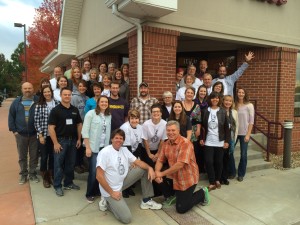Opportunity for 18 Grand County Business Owners to Participate in Community Reinvention Destination Business Program
Grand County Economic Development will pay for 18 Grand County business owners to participate in Jon Schallert’s Community Reinvention Program which begins with a 2½-day Destination BootCamp in Longmont on October 25-27. The organization is accepting applications for the grants until September 15.
Last year, 18 county business owners took advantage of a similar opportunity to participate in Schallert’s Community Reinvention Program that included his 20-hour Destination BootCamp workshop, 4-months of follow-up training, and a 1-on-1 on-site visit from Schallert to provide specific marketing advice to grow their businesses into “Consumer Destinations” (see photo below).
 Schallert, who has taught tens of thousands of entrepreneurs how to make their shops irresistible to both local and tourist customers, started developing his trademark 14-point strategy during a decade at Hallmark Cards where his model was called “The Schallert Method”. Schallert’s firm, The Schallert Group, started in 1996 and is based in Longmont, where he holds six Destination BootCamps a year. Over the last 14 years, over 50 counties, cities, and towns have participated in the Community Reinvention Program.
Schallert, who has taught tens of thousands of entrepreneurs how to make their shops irresistible to both local and tourist customers, started developing his trademark 14-point strategy during a decade at Hallmark Cards where his model was called “The Schallert Method”. Schallert’s firm, The Schallert Group, started in 1996 and is based in Longmont, where he holds six Destination BootCamps a year. Over the last 14 years, over 50 counties, cities, and towns have participated in the Community Reinvention Program.
“I learned so much,” said Rachel Rayburn, owner of Altitude Jewelry in Winter Park, who attended last year. “It really feels like I’m now starting to see the benefits of that. It just took me a while to sift through all that new information. I was letting everything go on autopilot, and I wasn’t doing anything to market, and that was a mistake. He said, ‘Do lots of little pivots, do little low-cost things, see what works for you. We’ve had a lot of success with that.”
Rayburn implemented Schallert’s shop-rearrangement suggestions after his visit – putting a signature jewelry line on a dominant wall rather than by the door, for example – with immediate results.
“We flipped all of the cases and moved everything around,” she said. “We started seeing the sales of what we make increase almost immediately.”
To apply the BootCamp ideas to her Mountain Grind Coffee & Bistro in Winter Park, Susan Volk displayed her unique positioning statement on her most visible wall, promoted local food on a Wall of Fame behind her counter, and installed a copper replica of an old-fashioned expresso machine as the coffee shop’s “monument.”
“It was great to be able to put some of those things to use,” Volk said. “I was also able to use some of that information to create a new brochure that did a better job at telling my story. I think it’s generated a little buzz as well.”
Steve Kudron, owner of Quacker Gift Shop in Grand Lake, said the tips helped his personal business approach as well as his marketing. The store, which specializes in unique tourist-related items like rubber duckies, hand lotions, and fresh fudge, has online and wholesale components, along with his storefront on the boardwalk in Grand Lake.
“During the BootCamp, one of the things I learned was having the right kind of balance as a leader and what were some of the tools to be able to do that,” Kudron said. “That was a good refresher for me and an opportunity for me to make positive changes in our business.
‘I was able to take our understanding as a destination type store and really turn it using his unique positioning concepts. I was able to drill down and find the right blend of marketing as well as uniqueness in our store to really make a difference.”
Last year’s event also provided business owners in the county an opportunity to meet and start sharing ideas. Business owners from Winter Park, Fraser, Granby, Grand Lake, and Kremmling all attended last year.
“It was great to meet people from other parts of the county,” said Volk, who later took a four-day trip to meet fellow participants in their own shops. “I met with a lot of those different business owners and got a chance to check out their businesses. I was struck with the creativity and energy they had there. Hopefully that raised some awareness for businesses in other parts of the county.
“It’s very challenging, particularly in small and rural areas where it can seem very competitive at time. The more of us that are succeeding, whether we have competing businesses or not, the better it is for all of us. I came away from the BootCamp and the Community Reinvention Program with a really strong sense of that, and I’d like to see that carried on to businesses across Grand County.”
Small business owners may apply to participate in this year’s Community Reinvention Program by submitting a letter of interest. Grand County Economic Development received a $27,000 U.S. Department of Agriculture grant with a token $290 investment from the County for the program. Eligible businesses must have fewer than 50 employees and less than $1 million in gross sales to qualify.
For more information and to apply for the program, call Grand County Economic Development at (970) 531-1343 or email: [email protected].







